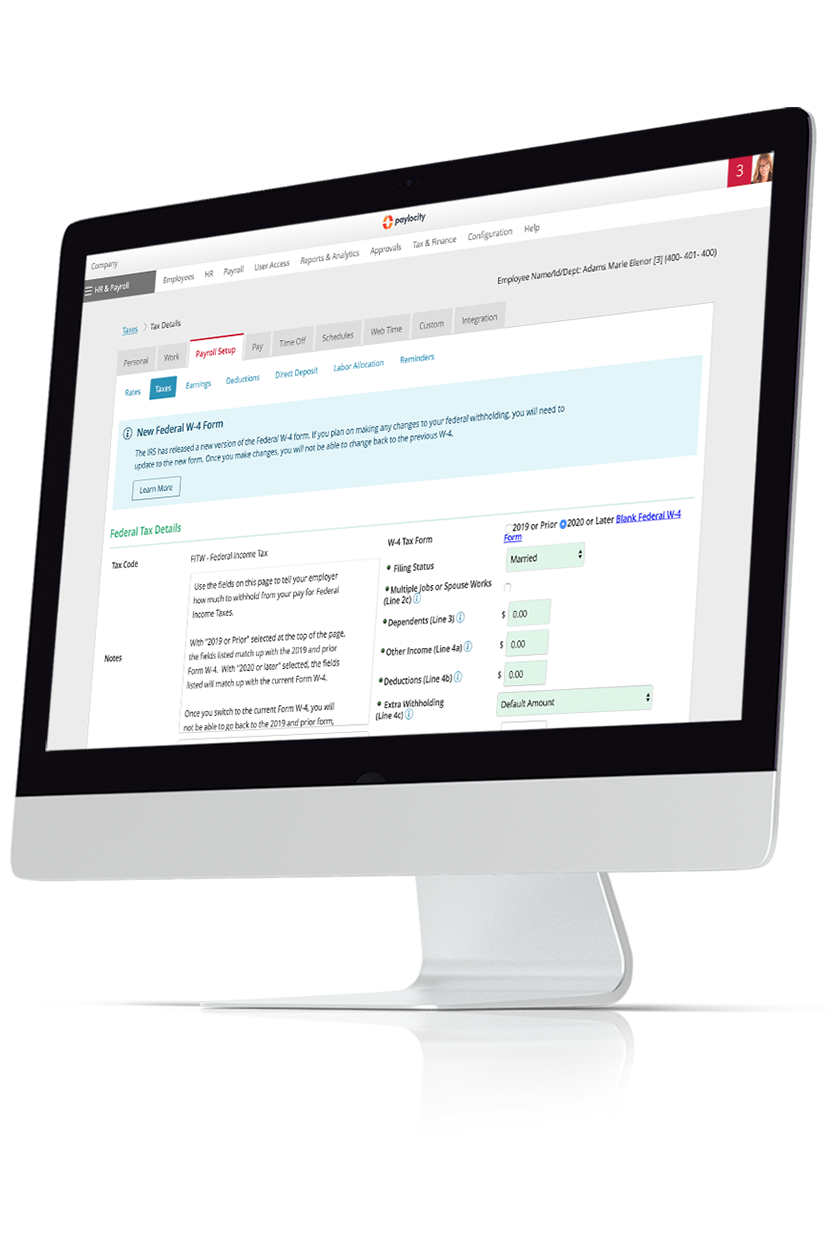Washington Wage and Payroll Tax Facts
February 02, 2024
Having to comply with unique state taxes and wage laws can make processing payroll doubly daunting. Here’s everything you need to know about these rates and laws for the state of Washington.
Select a state or federal tax guide

The Evergreen State requires a substantially higher minimum wage rate than the one required by the federal government. So much higher that it’s over double the amount of the federally required rate.
Moreover, the cities of Bellingham, SeaTac, Seattle, and Tukwila have unique minimum wage rates, which can sometimes adjust based on the employer’s size or whether they offer health benefits.
When it comes to processing payroll, Washington-based organizations must handle the following taxes in addition to those required by the federal government:
- State Unemployment Insurance (SUI)
- Paid Family and Medical Leave (PFML)
- Washington Cares Fund
The below information was last updated January 31, 2024. It is not intended as legal or tax advice.
Washington Minimum Wage Rates
|
Wage Type |
Washington Rates |
Federal Rates |
|
Minimum Wage |
$16.28 |
$7.25 |
|
Tipped Minimum Wage |
N/A |
$2.13 |
|
Actual Tip Credit |
N/A |
$5.12 |
Local Minimum Wage Rates
In addition to the state-wide minimum wage rates above, some cities have unique minimum wage rates as well:
|
Location |
Wage Rate |
| SeaTac |
$19.71 |
| Seattle | $16.50 (small employers; fewer than 500 employees) $19.97 (large employers; 500 or more employees) |
| Tukwila | $18.29 (mid-size employers; 15 - 500 employees worldwide) $20.29 (large employers; 500 or more employees worldwide) |
These rates apply to the following employer types:
SeaTac
- Hospitality and transportation employers within the city boundaries.
Seattle
- Companies with more than 500 employees globally.
- Companies with 500 or fewer employees globally where workers don't receive tips or healthcare benefits from their employer.
- Companies with 500 or fewer employees globally where workers do receive tips or healthcare benefits from the employer must be paid at least $18.69 an hour in minimum compensation, which is the sum of wages, tips, and the cost to the employer of providing healthcare benefits.
Tukwila
- Large employers with more than 500 employees globally.
- Mid-size employers with 15-500 employees worldwide, or with over $2 million of annual gross revenue in Tukwila.
Washington State Income Tax (SIT) Rates
Washington is one of the few states that does not impose or collect a personal income tax.
Washington State Unemployment Insurance (SUI) Rates
SUI provides unemployment benefits to eligible workers who are unemployed through no fault of their own (as determined by state law) and meet the state’s eligibility requirements.
|
Washington SUI Tax Details |
|
|
Taxable Wage Base |
$68,500 |
|
Employee Subject to Tax |
No |
|
Rates for Experienced Employers |
0.27% - 8.15% |
|
Rates for New Employers |
Varies by industry |
|
Effective Period |
Calendar Year |
|
Voluntary Contributions Allowed |
Yes; must be received by February 15 of the tax rate year. |
| Employer Administration Fund | Varies (will appear on organization's tax rate notice) |
Washington State Disability Insurance (SDI) Rates
SDI benefits are funded by employees through mandatory payroll deductions from each paycheck. Washington, however, doesn't require employers to collect an SDI tax.
Miscellaneous Washington Tax Information
Reciprocal Agreement(s)
Reciprocal agreements are when workers who live and work in different states are only required to pay taxes to the state where they live. Washington currently has no reciprocal agreements with any other states.
This doesn’t mean, however, that interstate workers living in Washington pay double. It’s federally illegal for two states to tax the same income. In most cases, the employee’s work state will credit or refund them at tax time based on the taxes they owe their home state. If the tax rates differ, the employee must cover the difference.
Paid Sick Leave (PSL) Taxes
The state of Washington doesn’t require employers to collect PSL taxes, but it does have a program requiring such leave for eligible employees:
|
Washington PSL Details |
|
| Covered Employees | All except for doctors, lawyers, dentists, or salaried executive managers |
| Covered Employers | All |
| Accrual Method(s) | 1 hour per 40 hours worked |
| Carryover Maximum | 40 hours |
| Annual Accrual Maximum | None |
| Probationary Period | 90 days |
| Frontloading Allowed | Yes |
| FAQs | Washington PSL FAQs |
Paid Family and Medical Leave (PFML) Taxes
Like SDI, Washington’s PFML program is funded via mandatory payroll deductions and employer contributions.
|
Washington PFML Details |
|
| Covered Employees | Any who worked 820 hours in the state over the course of a year, except for federal employees, tribal business employees, and the self-employed |
| Covered Employers | All |
| Amount of Leave |
|
| Tax Rate | 0.74% of each employee’s wages (split 28.57% / 71.43% between employers* and employees respectively) |
| Wage Base Limit | $168,600 |
| Wage Replacement | Up to 90% of weekly wages until reaching the maximum benefit rate |
| Maximum Benefit Rate | $1,456 per week |
*Employers with fewer than 50 employees are only required to collect and remit the employee’s portion of this rate, though they can choose to pay some of the employee portion if they wish.
Washington Cares Fund Taxes
The Washington Cares fund is a public, long-term care insurance program designed to provide affordable care to individuals who need assistance with two activities of daily living (ADLs) or one instrumental activity of daily living (IADL).
Also like SDI, this program is funded via mandatory payroll deductions, and employees can begin filing claims on July 1, 2026.
|
Washington Cares Fund Details |
|
| Covered Employees | All except for federal employees, tribal business employees, and the self-employed |
| Covered Employers | All |
| Eligibility Requirements |
There are three ways to gain eligibility:
|
| Tax Rate | 0.58% |
| Maximum Benefit Amount | $36,500 |
| FAQs | Washington Cares Fund FAQs |
*Any year an individual works 500 or more hours while making contributions to the fund.
Washington Employer Registration
The agencies below can help with your state-based employer registration, including best practices, account numbers, and unemployment information. Contact the Department of Revenue for withholding tax topics, and the Employment Security Department for unemployment tax topics.
|
Registration Details |
Department of Revenue |
Employment Security Department |
|
Phone |
(360) 902-5999 | (855) 829-9243 |
|
Online Registration |
Business Licensing Wizard | |
|
Registration Form |
Form 700 028 | |
|
Registration Instructions |
Online and paper registration available. | |
|
Employer Self-Service Login |
My DOR Login Page | EAMS Login Page |
Additional Washington Payroll Tax Resources
- Department of Revenue Business page
- Business Tax Basics Guide
- Business Licensing and Renewals FAQs
- Employment Security Department Employer Resources
This information is provided as a courtesy and may be updated at any time. It is not intended as legal or tax guidance. If you have questions or concerns, we encourage you to seek the advice of a qualified CPA, tax attorney, or advisor.

Get Taxes Done Right, Without the Stress
We know there's a lot that goes into preparing and filing payroll tax forms. Save time and get support from our expert team. As a Registered Reporting Agent with the IRS, we can help prepare and file all the necessary forms you need to remain compliant - even in the face of changing legislation. Learn more here.